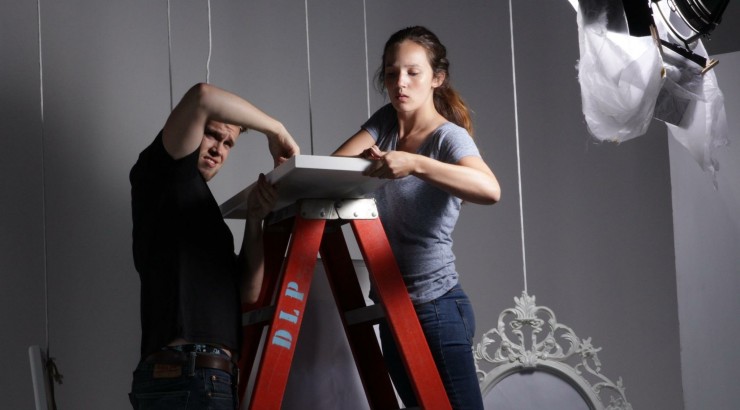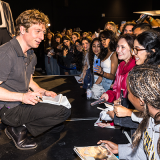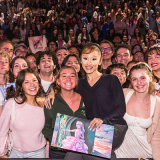Alumni Spotlight – Rebekah Scheys
February 22, 2016
Every so often, we’ll be spotlighting alumni and what they are up to these days. These Q&A sessions will give you a bit of insight into where the world has taken them since graduation.
This week, the spotlight is on Rebekah Scheys (MFA/Production Design ’15).
DODGE: Share your career path with us – how did you get where you are now?
Rebekah: Currently, I’m working in the Art Department on the CBS television show Supergirl. I credit the Production Design program at Chapman for helping me get the job, as the work that I did while at school qualified me to apply for an apprenticeship program that the Art Director’s Guild offers. I was selected as an alternate for the program, and the ADG sent my resume to a number of television shows, which ultimately led to Supergirl hiring me.
DODGE: What was the biggest adjustment you faced after graduation and how did you overcome it?
Rebekah: I think the biggest difficulty that I faced, post-graduating, was working as a freelance designer and learning how to deliver a good set on a limited budget. It’s a fine line, balancing the budget for materials and things that will actually show on camera with the budget for things like transportation and the labor to get everything done.
At first, in situations where I was given a very low budget, it was tempting for me to try to take on all of the work myself in order to devote most of the funds to creating the best set possible. I quickly realized, however, that that model was unsustainable. The way to get the best product was not by exhausting myself to the point where I couldn’t even create quality work anymore, but to ensure that right from the start, I had the resources that I needed to safely and effectively do the best that I could with what I had.
I learned that even before taking a job, I needed to ensure there would be enough money and resources for me to do my job effectively, with the support that I needed. I also learned that it’s important to communicate with a director about what is doable. Even with unlimited creativity, an extremely low budget can only yield a certain level of results, but discussing this early on helps everyone get on the same page as far as what we want to prioritize. At best, these discussions can sometimes result in additional support or a bigger budget, and at the very least, they can help to ensure that everyone is on the same page and that the director knows what she/he is getting.

Scheys on the set of Straw Dogs, which she designed
DODGE: What is the best advice you have received and/or what advice would you give current students?
Rebekah: A piece of advice that many different people have shared with me is: “Don’t forget to be likeable. The person hiring you won’t necessarily pick the most talented applicant, they’ll pick someone who they want to be around every day.”
I’ve already found that to be true, in the types of people who I see get hired into my department. Talent and hard work are extremely important, but if you combine those characteristics with the ability to handle stressful situations or bad days with efficiency and a good attitude, you will become an invaluable asset to any department and people will want to bring you with them from job to job.
DODGE: What is your favorite memory from your time at Chapman?
Rebekah: The best experiences that I took from my time at Chapman were forming a community with my fellow production design classmates and working on my two thesis films. The kind of camaraderie that develops when you have six students all practically living in the production design room, going to every class together, working on homework assignments together and prepping for films together, is something special. There’s a certain bond that forms when you spend six hours in an over-sized art truck picking up props with someone, or devote days to carving foam blocks together while wearing ridiculous Breaking Bad masks, or construct and paint an entire set together. And it’s amazing to share that moment of pride when you finally see your set on film and it looks great, because you know how much work went into it, and that you couldn’t have done it alone.
DODGE: What have you taken from the classroom and applied to your career?
Rebekah: A skill that I really developed in my time at Chapman was thoroughly researching reference material for use in creating anything from a very specific set or furniture piece to an entire world. I learned how to be very intentional about establishing the look that I wanted by creating tone boards that show the director what I envision for the script and where those references come from.
One of the best parts of my job on Supergirl is that I get to do a majority of the research for the show. I’ll select a collection of images which the show’s designer will then pick from in order to establish the direction that the design of each new set will take. When the process works well, I might find a particular image which will motivate the entire look of a new set, and in the cases where that happens, seeing the finished product built and shot is an incredibly fulfilling experience.


